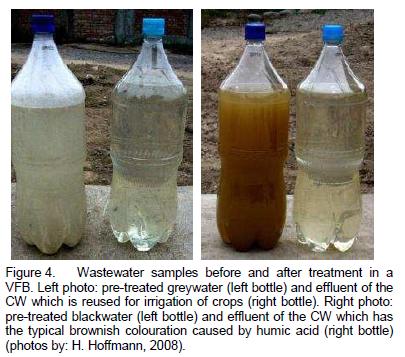- Resource recovery
- Greywater, blackwater or wastewater reuse, irrigation
- User perception and acceptance of recycled water (includes colour issue)
User perception and acceptance of recycled water (includes colour issue)
7150 views
- Elisabeth
-
- User is blocked
- Freelance consultant since 2012
Less- Posts: 3372
- Karma: 54
- Likes received: 932
Re: User perception and acceptance of recycled water
Thanks for these interesting contributions, I have enjoyed reading them.
Gerwin: have you reached any conclusions yet?
On the issue of colour, I have come across this information in our wonderful technology review on constructed wetlands (even if I say so myself
2.8.4 Colour aspects
The effluent from any biological wastewater treatment
process such as a constructed wetland can have a yellowish
or brownish colour. This is caused by humic substances,
such as humic acids or humins (Figure 4). The colouration
may reduce the social acceptance of wastewater reuse.
Humic acids originate from the biological degradation of
organic matter, being the unbiodegradable fraction of organic
matter. Humic acids are a natural compound of soil, lake and
river water. They are not harmful to the environment but they
have a negative impact on disinfection processes with
chlorine or UV radiation.
When treated wastewater is used for toilet flushing, it is
easier to use coloured porcelain for the toilet bowl than to
attempt to remove the coloration, since humic substances
can be only removed by advanced technologies such as
activated carbon, ozone, photo catalytic oxidation (Guylas et
al., 2007; Abegglen et al., 2009).
From the main author’s experiences, greywater after
treatment in a constructed wetland tends to have no colour.
On the other hand, domestic wastewater or blackwater after
treatment in a constructed wetland is often, but not always,
slightly yellow or brown (see for example Figure 4).
Source:
Hoffmann, H., Platzer, C., von Münch, E., Winker, M. (2011). Technology review of constructed wetlands - Subsurface flow constructed wetlands for greywater and domestic wastewater treatment. Deutsche Gesellschaft für Internationale Zusammenarbeit (GIZ) GmbH, Eschborn, Germany.
www.susana.org/lang-en/library/library?v...peitem&type=2&id=930
(also available in Spanish)
Regards,
Elisabeth
Freelance consultant on environmental and climate projects
Attachments:
-
 Clipboard0...7-18.jpg
(Filesize: 37KB)
Clipboard0...7-18.jpg
(Filesize: 37KB)
Please Log in to join the conversation.
You need to login to replyQuite often, the wastewater of a town is treated in municipal wastewater treatment plants and then is discharged into a receiving stream. This stream then becomes the source of raw water for water treatment plants of the downstream towns, where the water is treated in the water treatment plants and supplied to the people. So, you see, in a way, the treated wastewater is used for drinking purposes.
But, if you put treated wastewater in a glass and ask a person to drink it, psychologically, he/she won't, though from bacteriological point of view, the water may be safe to drink. I think, in our Muslim culture, we are not allowed to drink treated wastewater, in its first degree form.
Cheers,
F H Mughal
Karachi, Pakistan
Please Log in to join the conversation.
You need to login to replyPersonal Portfolio Website
Attachments:
-
sanitation...hoto.JPG (Filesize: 32KB)
Please Log in to join the conversation.
You need to login to reply- joeturner
-
 Less
Less- Posts: 717
- Karma: 23
- Likes received: 185
This one by Robinson, Robinson and Hawkins is about perceptions in urban USA. They examined a number of different reuses, with varying responses - however 'personal' use of recycled wastewater seems to make most people uncomfortable.
Dolnicar, Hurlimann and Grün cite quite a few different studies on social attitudes to recycled water, again suggesting that whilst many are happy to use it, much fewer would use it in close-tp-body personal ways.
Schmidt makes some interesting comments regarding the 'yuck' factor - and seems to suggest that people are right to reject things we find instantly repugnant.
Ching's interesting doctoral thesis looks at this in relation to Singapore, where the yuck factor was successfully overcome, comparing it to Australia where it wasn't.
It seems to me that it is highly likely that the way the question is framed will affect how it is accepted in many different cultures.
Please Log in to join the conversation.
You need to login to replyAlso I recall that in some of the research projects that reclaim wastewater for toilet flushing, color was an issue as it was difficult to remove even in a membrane system. Not sure any more which project it was, perhaps by EAWAG or the Huber company.
Users perception of UD systems and recycle systems has been analysed in the pilot projects in the GIZ building (saniresch) and in the EAWAG building (Novaquatis), you should find these studies in the susana library. However the reuse was not going as far as you intend to do (handwashing).
Wastewater reclamation is a massive issue in the US and in Australia, I am sure there is research done also on users perception and acceptance, but I don't know any specific studies, sorry.
Please Log in to join the conversation.
You need to login to reply- jansengerwin
-
 Topic Author
Topic Author- Design Engineer at Delft University of Technology
Less- Posts: 13
- Likes received: 5
Any chance you know of studies on this topic?
One thing we'll be researching is how a brand can help to build trust and give recycled water a better image.
Please Log in to join the conversation.
You need to login to replyno easy answer to that question, as usual, it depends. You already mention religious and cultural background, probably the most important factor are the incentives (cost).
In extreme water scarce areas, people may even accept reclaimed wastewater as drinking water (Windhoek), in other areas even irrigation use meets resistance (the latter situation being quite common, the first very exepetional).
Besides the need to prove effectivness of disinfection and build a lot of trust in the technology, all visible parameters are important for acceptance, obviously smell and taste, but also color. Color is a common issue in recycling systems, as it is difficult to remove and easy to see, thus difficult to accept although not harmfull as such.
To give a general answer nevertheless, I think it will be not easy to find user acceptance for such a psychologically sensitive use as hand washing with reclaimed water. I also think that it will not be much more easy in individual toilets, compared to shared facility. More pragmatic approach is downcycling, e.g. use reclaimed water for flushing, and fresh water for handwashing.
Please Log in to join the conversation.
You need to login to reply- jansengerwin
-
 Topic Author
Topic Author- Design Engineer at Delft University of Technology
Less- Posts: 13
- Likes received: 5
User perception and acceptance of recycled water (includes colour issue)
I have a few questions regarding the reuse of water.
Would people (from different religious/cultural backgrounds) accept to use water for hand washing and anal cleansing if that water was reclaimed and treated after the same activities? (we use sand filter and UV disinfection)
If yes, what are critical conditions? (for example, no smell or taste that refers to prior usage i.e. hand washing or anal cleansing)
Is the acceptance different for shared toilets?
I'd love to hear your experiences or get to know literature on this topic.
Thanks!
Gerwin
Please Log in to join the conversation.
You need to login to reply- Resource recovery
- Greywater, blackwater or wastewater reuse, irrigation
- User perception and acceptance of recycled water (includes colour issue)








